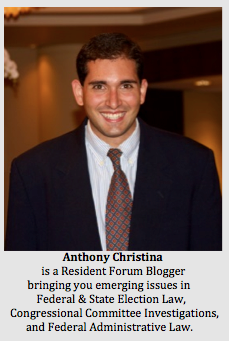Getting on the ballot as a candidate for office is a complicated process in each of the 50 states. For the most part, states hold their primary elections sometime between January and late summer. Each state has different levels of ballot access. Furthermore, degrees of entry depend upon the position. For third-party candidates, the barriers to entry are substantial.
There will be hundreds of candidates elected to office in November, however, the one at the top of everyone’s list will be the President of the United States. While the national debate has centered around the Iowa Caucuses and New Hampshire and South Carolina Primaries, a substantial amount of work by a candidate’s campaign goes into gaining access to the ballot in the weeks and months leading up to each state’s primary or caucus.
According to FairVote, which tracks ballot access laws across the country, the laws range from a candidate’s campaign paying a modest filing fee to submitting nominating petitions with a requisite number of signatures. For example, in Florida if you are from one of main two political parties, the state doesn’t require any petition. In contrast, Washington D.C. requires exactly 3,000 signatures to be included on the ballot for any district-wide partisan office other than the Presidency, which requires 4,700 valid signatures.
Pennsylvania has one of the strictest ballot access laws. According to the Pennsylvania Department of State, a candidate has from January 26th until February 16th to circulate nominating petitions. The Department of State mandates that a candidate seeking the office of President of the United States (Republican or Democrat) obtain 2,000 signatures of registered voters and pay a $200.00 filing fee. Since ‘challenges’ to the signatures of a candidate’s petitions are fairly common, the rule of thumb is to obtain roughly double the amount of signatures required—in this case 4,000.
The Pennsylvania Voter Guide goes on to say:
Each signer of a nomination petition must be a registered and enrolled elector of the political district and of the party referred to in the nomination petition. (Democratic electors must sign Democratic nomination petitions; Republican electors must sign Republican nomination petitions). Each signer may only sign nomination petitions for as many candidates for each office as they are permitted to vote.
Pennsylvania’s law is unique in that it not only regulates the signers, it regulates the circulators of those petitions as well. This portion of the law provides the biggest hurdle for out-of-state Presidential campaigns. Pennsylvania Election Code, 25 P.S. § 2869, requires that “[a]ny person who circulates this nomination petition must be a qualified registered elector of the Commonwealth and of the party referred to in the petition.” This effectively bars Presidential campaign workers who are out-of-state residents to come to Pennsylvania to circulate petitions.
Pennsylvania’s law was recently challenged in federal court by an operative working for libertarian-leaning Republican Presidential candidate, Senator Rand Paul. According to The Legal Intelligencer, in an opinion issued by U.S. District Judge Yvette Kane of the Middle District of Pennsylvania, Texas political consultant Trent Pool had his request for a Temporary Restraining Order denied.
Pool’s had filed suit against Pennsylvania’s Secretary of State, Pedro Cortes, and the Commissioner for Bureau of Commissions, Elections and Legislation, Jonathan Marks. Pool alleged that the requirement that those who circulate petitions be registered Pennsylvania voters, the requirement that signatures be notarized, and the “one signature, one voter” rule violated his First Amendment rights.
In her opinion, Judge Kane stated, “the loss of First Amendment freedoms, for even minimal periods of time, unquestionably constitutes irreparable injury,” however Judge Kane further opined that “the assertion of First Amendment rights does not automatically require a finding of irreparable injury.”
Since Pool filed his motion for a Temporary Restraining Order in the middle of the three week petition gathering time period, this proved especially problematic for the Court:
The court is persuaded that given the late date of plaintiffs’ challenge relative to the nomination-petition circulating period, the public interest is unquestionably better served by preserving the status quo. . . . Commissioner Marks of the Bureau of Commissions, Elections, and Legislation testified that roughly 1,400 nomination petitions are currently in circulation with instructions to circulators that include all three of the statutory requirements challenged here. An order from this court suspending these requirements will necessarily result in unequal application of the law and create the potential for legal challenges in the Commonwealth Court of Pennsylvania. . . . [T]he risk of injecting chaos and uncertainty into a time-tested process is far greater than any constitutional deprivation shown by plaintiffs at this stage of the proceedings. In short, such extraordinary relief would cause great risk to an essential public function, in ostensible service to plaintiffs’ private interests that remain, at least for now, undefined.
As it currently stands, out-of-state Presidential campaigns must contract and associate with registered Pennsylvania voters on the ground who will traverse the Commonwealth to gather signatures. Given the shoestring budget for many lower tier campaigns, this barrier to entry can prove to be a costly and logistically difficult endeavor given the geographic diversity of Pennsylvania in the dead of winter. However, for a well-organized campaign with enough local support to overcome the ballot access hurdles, the reward is significant access to delegates from the sixth largest state in the Union.
Published February 28, 2016
